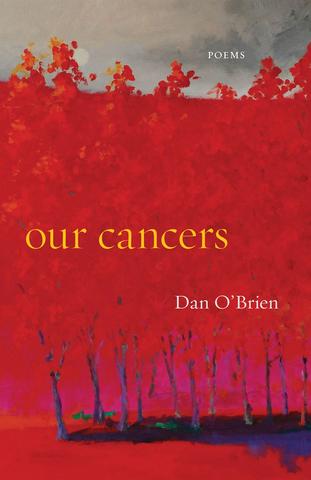
Review by Megan Kuklis
Our Cancers – by Dan O’Brien
Acre Books, 2021
Deeply personal and touching, Dan O’Brien’s chronicle in poems, Our Cancers, begins on the fourteenth anniversary of 9/11 when Dan’s wife finds a lump in her breast. Six months later, the author also receives a cancer diagnosis. With their daughter not yet two years old, the couple are immersed into a new world of chemotherapy, radiation and multiple surgeries, all while raising their daughter in this exhausting new world order. In the introduction, the author’s hope is that the collection “conveys the trajectory of trauma, while celebrating the will of caregivers to remain and renew.” A testament to resilience during ongoing trauma, these poems carve out snippets of wonder and remembrance to eulogize their twin disasters. This collection reminds us that there are moments in any given day, even the bad ones, that are worth remembering.
The collection is split into two parts: the first part is about the author’s experience of his wife’s cancer and the second is about his experience with his own diagnosis and treatment. The individual poems are accessible with a brevity of description and images. The shortness of the lines and stanzas work in concert to convey the shock and terror of sudden catastrophe: “you pause / at the running / faucet to ask Love // can you feel / my breast O / no O no” (3). The exhalations of “O” is echoed in the following poem recalling the devastation of 9/11: “the second tower / An old woman fell / to her knees O // no O no How / your tears then / scattered the road” (4). In the midst of a personal tragedy, it is normal to want to equate your feelings with something bigger.
In the 20 years since 9/11, the scale of the devastation still reverberates throughout the United States, Canada and the world. So, too, can a smaller tragedy fill a moment with perfect recall: a miscarriage, a cancer diagnosis, the death of a friend. O’Brien’s book suggests that both the global changes and the personal changes can equate to a single lucid memory that lives on, perhaps to comfort us, or to simply remind us that these moments, these memories, are a window into our past. “Every time / I find myself / alone // in a strange city / I imagine this / is my new home // I must find / my way / to live here” (17). The grief of being a bystander in a loved one’s diagnosis is alienating. As a sidekick, or cheerleader, or a shoulder to cry on, you need to hold in the grief for the loved one and not let it spill out on them.
Except that the author had barely time to grieve for his wife’s illness before his own: “The oncologist / lathers his hands / Nine months // he estimates until / we deliver your / death or life” (49). O’Brien’s cancer treatment mimics the gestation of a child except surgical prep, fevered dreams and lonely grief peppers from “in the womb / of our common / malady” (53). Poignant connections are made between the narrator feeling alone and sick and untethered and the child sleep training or “leap[ing] / barefoot / stone to stone” (12).
Illness is
crying out for
Mother.
Who does not come
to the crib as
darkness swallows
The child
has learned
his lesson (62)
Is the lesson that we are all alone in our illness and grief? Or perhaps that there is no lesson, just a collection of experiences that we have to endure.
The hospital is a lonely place; since the pandemic and lockdowns, it is even more so. Constant activities and vital-taking can leave a patient feeling superfluous and extra to their own experience. The “vampire- / phlebotomists” (69) make their way on their rounds, quick poke and a little pressure, to go off on their merry way with their crimson vials tilting rhythmically as they push back through the privacy curtain. There is no one way to experience cancer – each one is as unique as a birth or a death. Dan O’Brien’s collection has brought his experience of his wife’s and his own cancer into the realm of shared memory. Although deeply personal, his poetic memories transcend into the universal story of grief and caregiving. If you are in the midst of grieving, this book can be a visceral grief-binge that leaves the reader feeling emotionally drained. Ultimately, though, the journey through his memories is cathartic. The narrator and his wife’s journey through cancer ends positively and the reader is left with a message of hope on an evening bike ride: “night falls / moon rises / daughter laughs” (92).
Dan O’Brien is a poet and playwright. His poetry collections include Our Cancers, War Reporter, New Life, and Scarsdale. O’Brien is the recipient of a Guggenheim Fellowship in Drama and two PEN America Awards for playwriting. His work has been published in several issue of The Fiddlehead, most recently in issue 283 (Spring 2020). He lives in Los Angeles with his wife and daughter.











Add new comment